Marketing Report: Analysis of Rotorua Thermal Holiday Park and Lodge
VerifiedAdded on 2022/10/12
|10
|3479
|287
Report
AI Summary
This report presents a comprehensive analysis of the Rotorua Thermal Holiday Park, a 4-star rated holiday park in New Zealand. It begins with an internal audit, evaluating the park's features, benefits, resources, capabilities, strengths, weaknesses, and financial performance. The report then conducts an external audit using a PESTLE analysis to assess political, economic, social, technological, legal, and environmental factors. It identifies opportunities and threats, followed by competitive profiles and consumer segment descriptions. The report highlights the park's strengths, such as its innovation and diverse offerings, while acknowledging weaknesses like potential reliance on tourism. The analysis considers the Tangatarua Lodge, the student accommodation unit, and its role within the park. The report emphasizes the need for improved management and financial results and provides insights into market positioning and strategic recommendations for promoting the Tangatarua Lodge.
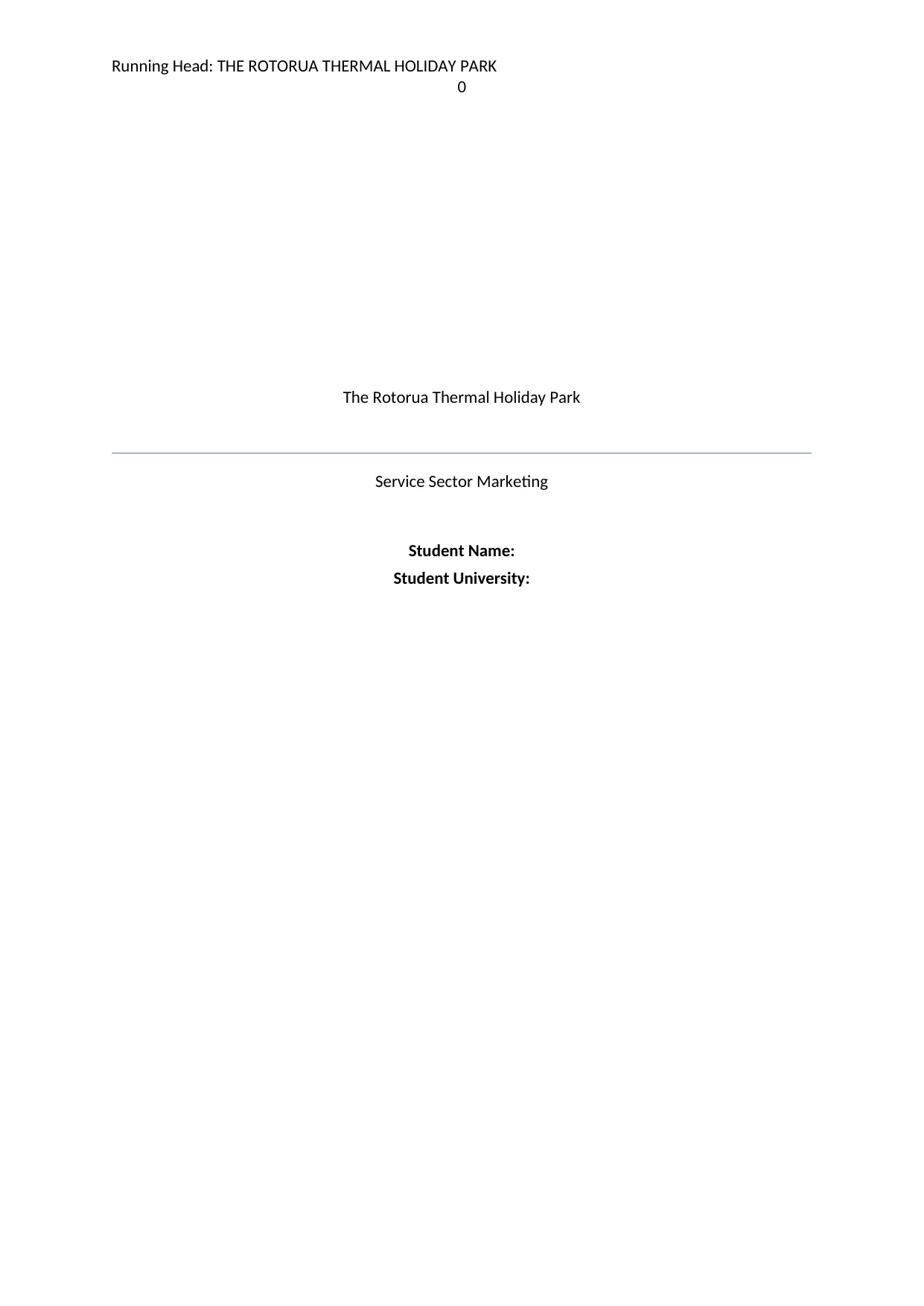
Running Head: THE ROTORUA THERMAL HOLIDAY PARK
0
The Rotorua Thermal Holiday Park
Service Sector Marketing
Student Name:
Student University:
0
The Rotorua Thermal Holiday Park
Service Sector Marketing
Student Name:
Student University:
Paraphrase This Document
Need a fresh take? Get an instant paraphrase of this document with our AI Paraphraser
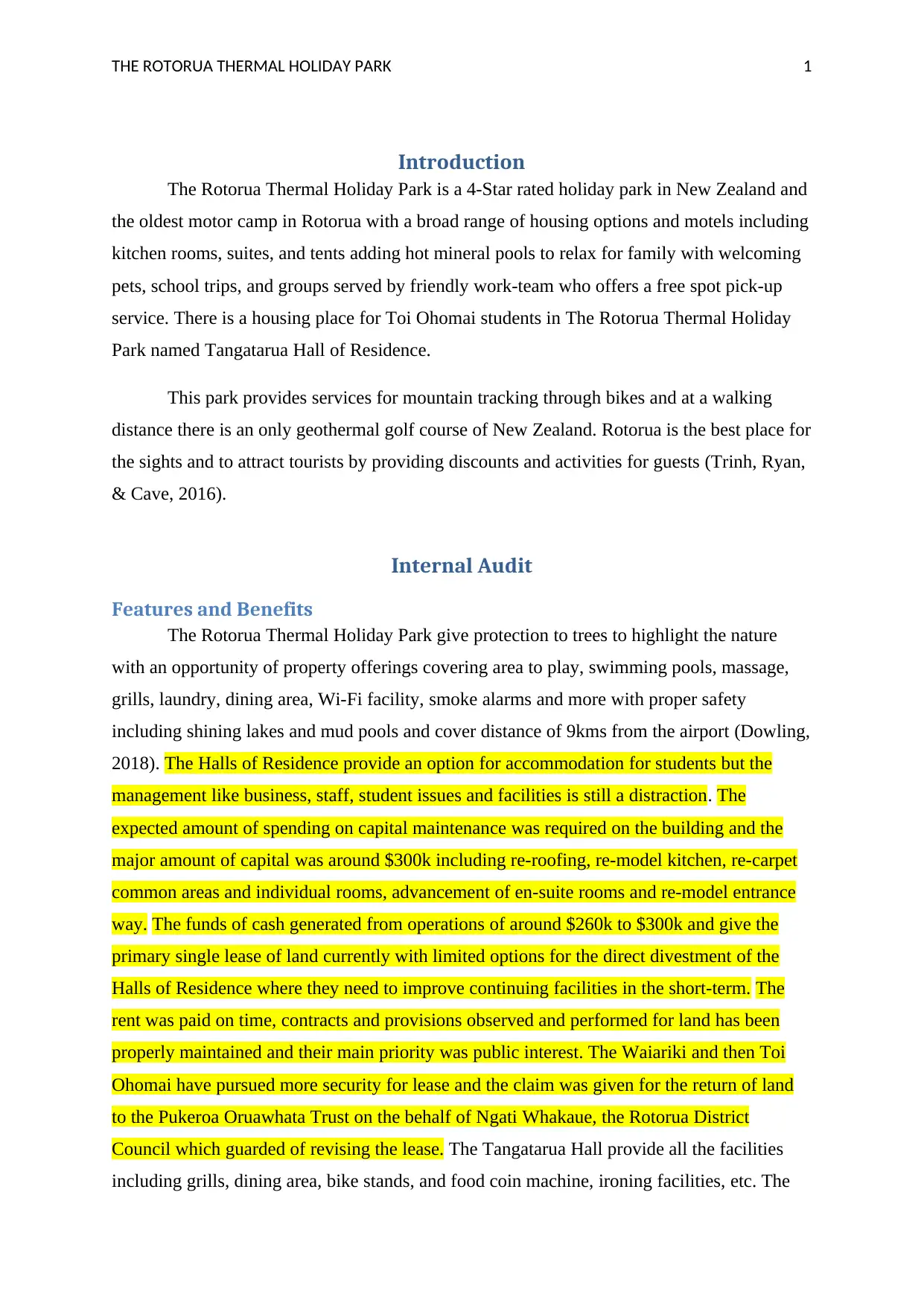
THE ROTORUA THERMAL HOLIDAY PARK 1
Introduction
The Rotorua Thermal Holiday Park is a 4-Star rated holiday park in New Zealand and
the oldest motor camp in Rotorua with a broad range of housing options and motels including
kitchen rooms, suites, and tents adding hot mineral pools to relax for family with welcoming
pets, school trips, and groups served by friendly work-team who offers a free spot pick-up
service. There is a housing place for Toi Ohomai students in The Rotorua Thermal Holiday
Park named Tangatarua Hall of Residence.
This park provides services for mountain tracking through bikes and at a walking
distance there is an only geothermal golf course of New Zealand. Rotorua is the best place for
the sights and to attract tourists by providing discounts and activities for guests (Trinh, Ryan,
& Cave, 2016).
Internal Audit
Features and Benefits
The Rotorua Thermal Holiday Park give protection to trees to highlight the nature
with an opportunity of property offerings covering area to play, swimming pools, massage,
grills, laundry, dining area, Wi-Fi facility, smoke alarms and more with proper safety
including shining lakes and mud pools and cover distance of 9kms from the airport (Dowling,
2018). The Halls of Residence provide an option for accommodation for students but the
management like business, staff, student issues and facilities is still a distraction. The
expected amount of spending on capital maintenance was required on the building and the
major amount of capital was around $300k including re-roofing, re-model kitchen, re-carpet
common areas and individual rooms, advancement of en-suite rooms and re-model entrance
way. The funds of cash generated from operations of around $260k to $300k and give the
primary single lease of land currently with limited options for the direct divestment of the
Halls of Residence where they need to improve continuing facilities in the short-term. The
rent was paid on time, contracts and provisions observed and performed for land has been
properly maintained and their main priority was public interest. The Waiariki and then Toi
Ohomai have pursued more security for lease and the claim was given for the return of land
to the Pukeroa Oruawhata Trust on the behalf of Ngati Whakaue, the Rotorua District
Council which guarded of revising the lease. The Tangatarua Hall provide all the facilities
including grills, dining area, bike stands, and food coin machine, ironing facilities, etc. The
Introduction
The Rotorua Thermal Holiday Park is a 4-Star rated holiday park in New Zealand and
the oldest motor camp in Rotorua with a broad range of housing options and motels including
kitchen rooms, suites, and tents adding hot mineral pools to relax for family with welcoming
pets, school trips, and groups served by friendly work-team who offers a free spot pick-up
service. There is a housing place for Toi Ohomai students in The Rotorua Thermal Holiday
Park named Tangatarua Hall of Residence.
This park provides services for mountain tracking through bikes and at a walking
distance there is an only geothermal golf course of New Zealand. Rotorua is the best place for
the sights and to attract tourists by providing discounts and activities for guests (Trinh, Ryan,
& Cave, 2016).
Internal Audit
Features and Benefits
The Rotorua Thermal Holiday Park give protection to trees to highlight the nature
with an opportunity of property offerings covering area to play, swimming pools, massage,
grills, laundry, dining area, Wi-Fi facility, smoke alarms and more with proper safety
including shining lakes and mud pools and cover distance of 9kms from the airport (Dowling,
2018). The Halls of Residence provide an option for accommodation for students but the
management like business, staff, student issues and facilities is still a distraction. The
expected amount of spending on capital maintenance was required on the building and the
major amount of capital was around $300k including re-roofing, re-model kitchen, re-carpet
common areas and individual rooms, advancement of en-suite rooms and re-model entrance
way. The funds of cash generated from operations of around $260k to $300k and give the
primary single lease of land currently with limited options for the direct divestment of the
Halls of Residence where they need to improve continuing facilities in the short-term. The
rent was paid on time, contracts and provisions observed and performed for land has been
properly maintained and their main priority was public interest. The Waiariki and then Toi
Ohomai have pursued more security for lease and the claim was given for the return of land
to the Pukeroa Oruawhata Trust on the behalf of Ngati Whakaue, the Rotorua District
Council which guarded of revising the lease. The Tangatarua Hall provide all the facilities
including grills, dining area, bike stands, and food coin machine, ironing facilities, etc. The
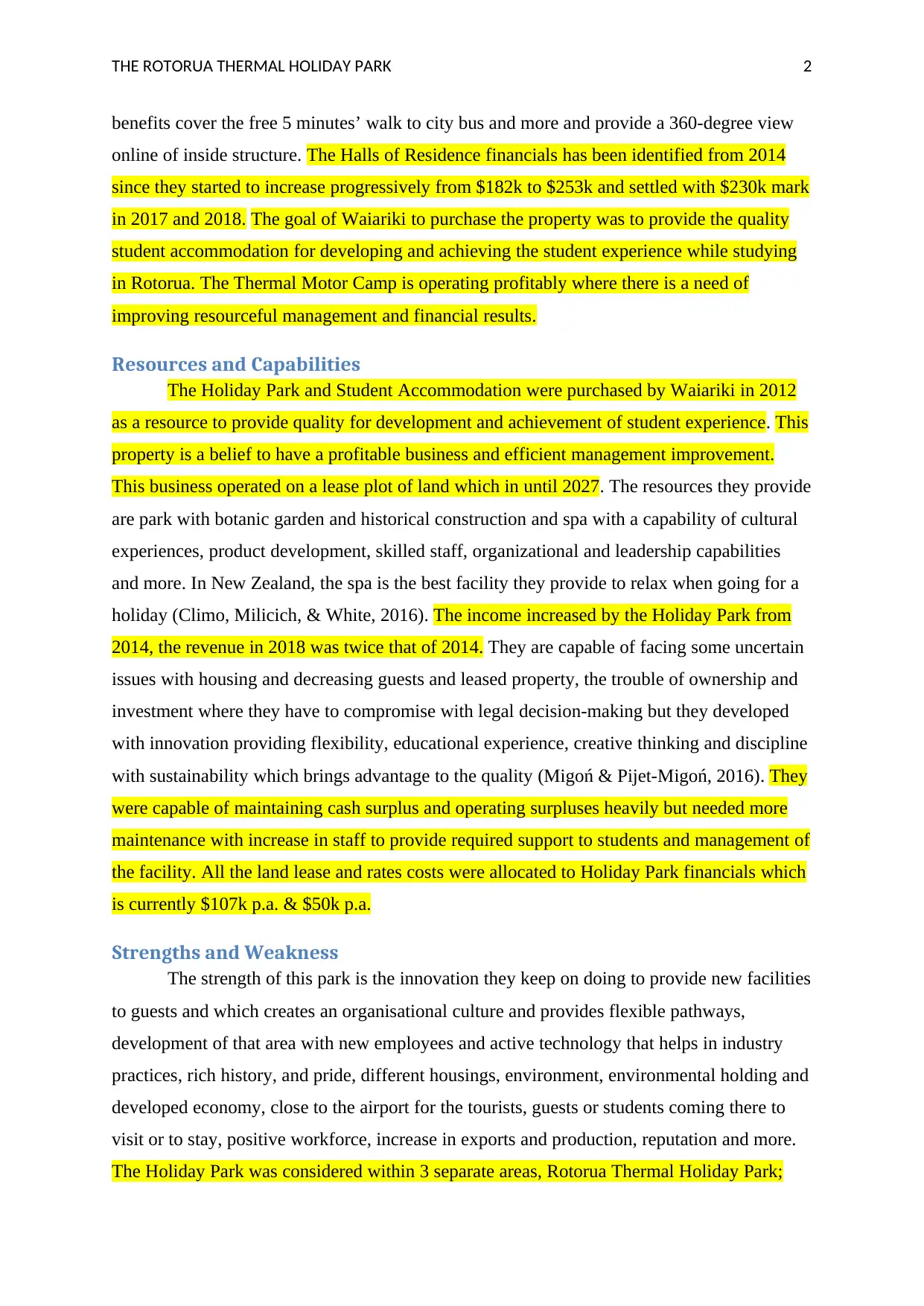
THE ROTORUA THERMAL HOLIDAY PARK 2
benefits cover the free 5 minutes’ walk to city bus and more and provide a 360-degree view
online of inside structure. The Halls of Residence financials has been identified from 2014
since they started to increase progressively from $182k to $253k and settled with $230k mark
in 2017 and 2018. The goal of Waiariki to purchase the property was to provide the quality
student accommodation for developing and achieving the student experience while studying
in Rotorua. The Thermal Motor Camp is operating profitably where there is a need of
improving resourceful management and financial results.
Resources and Capabilities
The Holiday Park and Student Accommodation were purchased by Waiariki in 2012
as a resource to provide quality for development and achievement of student experience. This
property is a belief to have a profitable business and efficient management improvement.
This business operated on a lease plot of land which in until 2027. The resources they provide
are park with botanic garden and historical construction and spa with a capability of cultural
experiences, product development, skilled staff, organizational and leadership capabilities
and more. In New Zealand, the spa is the best facility they provide to relax when going for a
holiday (Climo, Milicich, & White, 2016). The income increased by the Holiday Park from
2014, the revenue in 2018 was twice that of 2014. They are capable of facing some uncertain
issues with housing and decreasing guests and leased property, the trouble of ownership and
investment where they have to compromise with legal decision-making but they developed
with innovation providing flexibility, educational experience, creative thinking and discipline
with sustainability which brings advantage to the quality (Migoń & Pijet-Migoń, 2016). They
were capable of maintaining cash surplus and operating surpluses heavily but needed more
maintenance with increase in staff to provide required support to students and management of
the facility. All the land lease and rates costs were allocated to Holiday Park financials which
is currently $107k p.a. & $50k p.a.
Strengths and Weakness
The strength of this park is the innovation they keep on doing to provide new facilities
to guests and which creates an organisational culture and provides flexible pathways,
development of that area with new employees and active technology that helps in industry
practices, rich history, and pride, different housings, environment, environmental holding and
developed economy, close to the airport for the tourists, guests or students coming there to
visit or to stay, positive workforce, increase in exports and production, reputation and more.
The Holiday Park was considered within 3 separate areas, Rotorua Thermal Holiday Park;
benefits cover the free 5 minutes’ walk to city bus and more and provide a 360-degree view
online of inside structure. The Halls of Residence financials has been identified from 2014
since they started to increase progressively from $182k to $253k and settled with $230k mark
in 2017 and 2018. The goal of Waiariki to purchase the property was to provide the quality
student accommodation for developing and achieving the student experience while studying
in Rotorua. The Thermal Motor Camp is operating profitably where there is a need of
improving resourceful management and financial results.
Resources and Capabilities
The Holiday Park and Student Accommodation were purchased by Waiariki in 2012
as a resource to provide quality for development and achievement of student experience. This
property is a belief to have a profitable business and efficient management improvement.
This business operated on a lease plot of land which in until 2027. The resources they provide
are park with botanic garden and historical construction and spa with a capability of cultural
experiences, product development, skilled staff, organizational and leadership capabilities
and more. In New Zealand, the spa is the best facility they provide to relax when going for a
holiday (Climo, Milicich, & White, 2016). The income increased by the Holiday Park from
2014, the revenue in 2018 was twice that of 2014. They are capable of facing some uncertain
issues with housing and decreasing guests and leased property, the trouble of ownership and
investment where they have to compromise with legal decision-making but they developed
with innovation providing flexibility, educational experience, creative thinking and discipline
with sustainability which brings advantage to the quality (Migoń & Pijet-Migoń, 2016). They
were capable of maintaining cash surplus and operating surpluses heavily but needed more
maintenance with increase in staff to provide required support to students and management of
the facility. All the land lease and rates costs were allocated to Holiday Park financials which
is currently $107k p.a. & $50k p.a.
Strengths and Weakness
The strength of this park is the innovation they keep on doing to provide new facilities
to guests and which creates an organisational culture and provides flexible pathways,
development of that area with new employees and active technology that helps in industry
practices, rich history, and pride, different housings, environment, environmental holding and
developed economy, close to the airport for the tourists, guests or students coming there to
visit or to stay, positive workforce, increase in exports and production, reputation and more.
The Holiday Park was considered within 3 separate areas, Rotorua Thermal Holiday Park;
⊘ This is a preview!⊘
Do you want full access?
Subscribe today to unlock all pages.

Trusted by 1+ million students worldwide
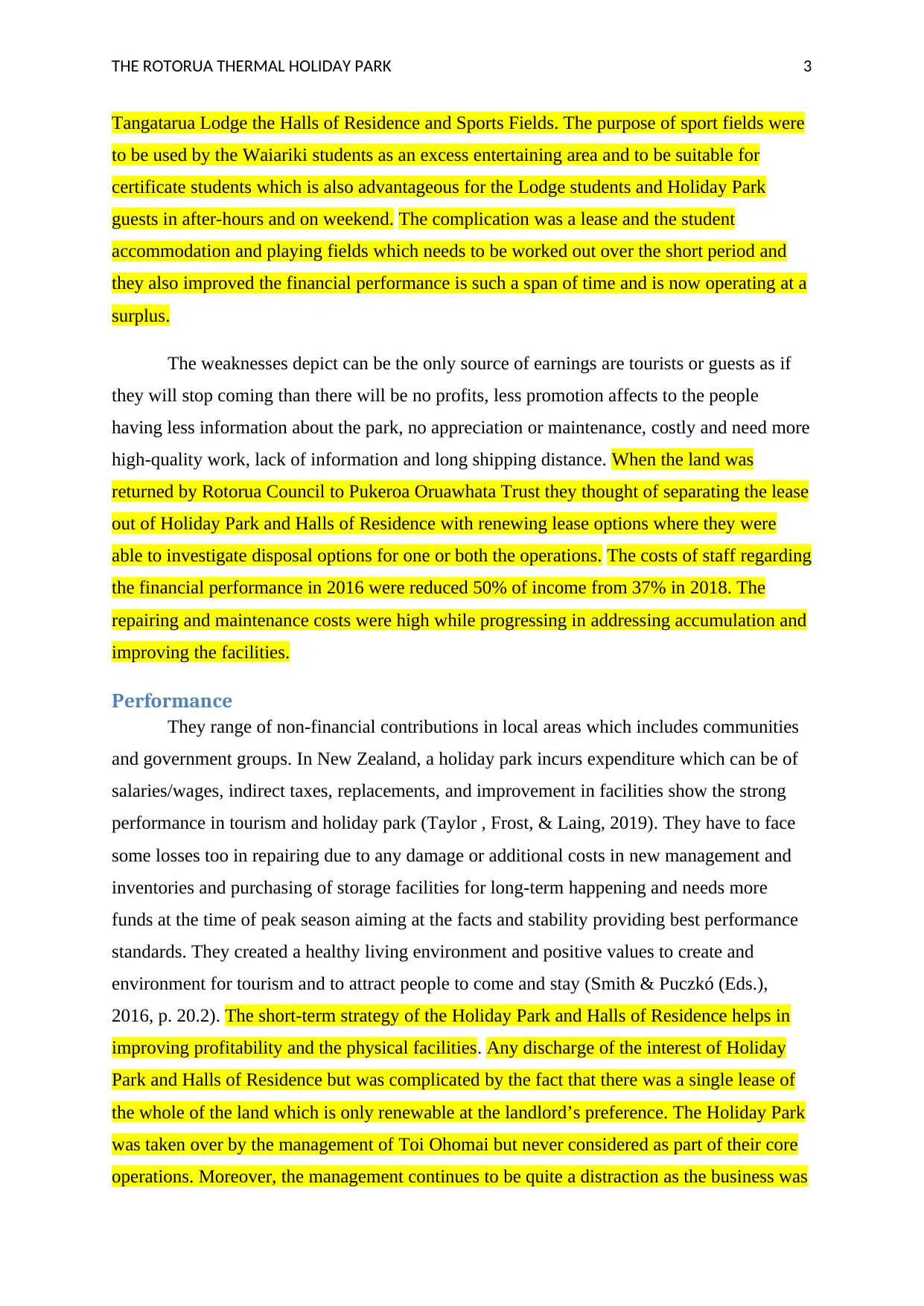
THE ROTORUA THERMAL HOLIDAY PARK 3
Tangatarua Lodge the Halls of Residence and Sports Fields. The purpose of sport fields were
to be used by the Waiariki students as an excess entertaining area and to be suitable for
certificate students which is also advantageous for the Lodge students and Holiday Park
guests in after-hours and on weekend. The complication was a lease and the student
accommodation and playing fields which needs to be worked out over the short period and
they also improved the financial performance is such a span of time and is now operating at a
surplus.
The weaknesses depict can be the only source of earnings are tourists or guests as if
they will stop coming than there will be no profits, less promotion affects to the people
having less information about the park, no appreciation or maintenance, costly and need more
high-quality work, lack of information and long shipping distance. When the land was
returned by Rotorua Council to Pukeroa Oruawhata Trust they thought of separating the lease
out of Holiday Park and Halls of Residence with renewing lease options where they were
able to investigate disposal options for one or both the operations. The costs of staff regarding
the financial performance in 2016 were reduced 50% of income from 37% in 2018. The
repairing and maintenance costs were high while progressing in addressing accumulation and
improving the facilities.
Performance
They range of non-financial contributions in local areas which includes communities
and government groups. In New Zealand, a holiday park incurs expenditure which can be of
salaries/wages, indirect taxes, replacements, and improvement in facilities show the strong
performance in tourism and holiday park (Taylor , Frost, & Laing, 2019). They have to face
some losses too in repairing due to any damage or additional costs in new management and
inventories and purchasing of storage facilities for long-term happening and needs more
funds at the time of peak season aiming at the facts and stability providing best performance
standards. They created a healthy living environment and positive values to create and
environment for tourism and to attract people to come and stay (Smith & Puczkó (Eds.),
2016, p. 20.2). The short-term strategy of the Holiday Park and Halls of Residence helps in
improving profitability and the physical facilities. Any discharge of the interest of Holiday
Park and Halls of Residence but was complicated by the fact that there was a single lease of
the whole of the land which is only renewable at the landlord’s preference. The Holiday Park
was taken over by the management of Toi Ohomai but never considered as part of their core
operations. Moreover, the management continues to be quite a distraction as the business was
Tangatarua Lodge the Halls of Residence and Sports Fields. The purpose of sport fields were
to be used by the Waiariki students as an excess entertaining area and to be suitable for
certificate students which is also advantageous for the Lodge students and Holiday Park
guests in after-hours and on weekend. The complication was a lease and the student
accommodation and playing fields which needs to be worked out over the short period and
they also improved the financial performance is such a span of time and is now operating at a
surplus.
The weaknesses depict can be the only source of earnings are tourists or guests as if
they will stop coming than there will be no profits, less promotion affects to the people
having less information about the park, no appreciation or maintenance, costly and need more
high-quality work, lack of information and long shipping distance. When the land was
returned by Rotorua Council to Pukeroa Oruawhata Trust they thought of separating the lease
out of Holiday Park and Halls of Residence with renewing lease options where they were
able to investigate disposal options for one or both the operations. The costs of staff regarding
the financial performance in 2016 were reduced 50% of income from 37% in 2018. The
repairing and maintenance costs were high while progressing in addressing accumulation and
improving the facilities.
Performance
They range of non-financial contributions in local areas which includes communities
and government groups. In New Zealand, a holiday park incurs expenditure which can be of
salaries/wages, indirect taxes, replacements, and improvement in facilities show the strong
performance in tourism and holiday park (Taylor , Frost, & Laing, 2019). They have to face
some losses too in repairing due to any damage or additional costs in new management and
inventories and purchasing of storage facilities for long-term happening and needs more
funds at the time of peak season aiming at the facts and stability providing best performance
standards. They created a healthy living environment and positive values to create and
environment for tourism and to attract people to come and stay (Smith & Puczkó (Eds.),
2016, p. 20.2). The short-term strategy of the Holiday Park and Halls of Residence helps in
improving profitability and the physical facilities. Any discharge of the interest of Holiday
Park and Halls of Residence but was complicated by the fact that there was a single lease of
the whole of the land which is only renewable at the landlord’s preference. The Holiday Park
was taken over by the management of Toi Ohomai but never considered as part of their core
operations. Moreover, the management continues to be quite a distraction as the business was
Paraphrase This Document
Need a fresh take? Get an instant paraphrase of this document with our AI Paraphraser
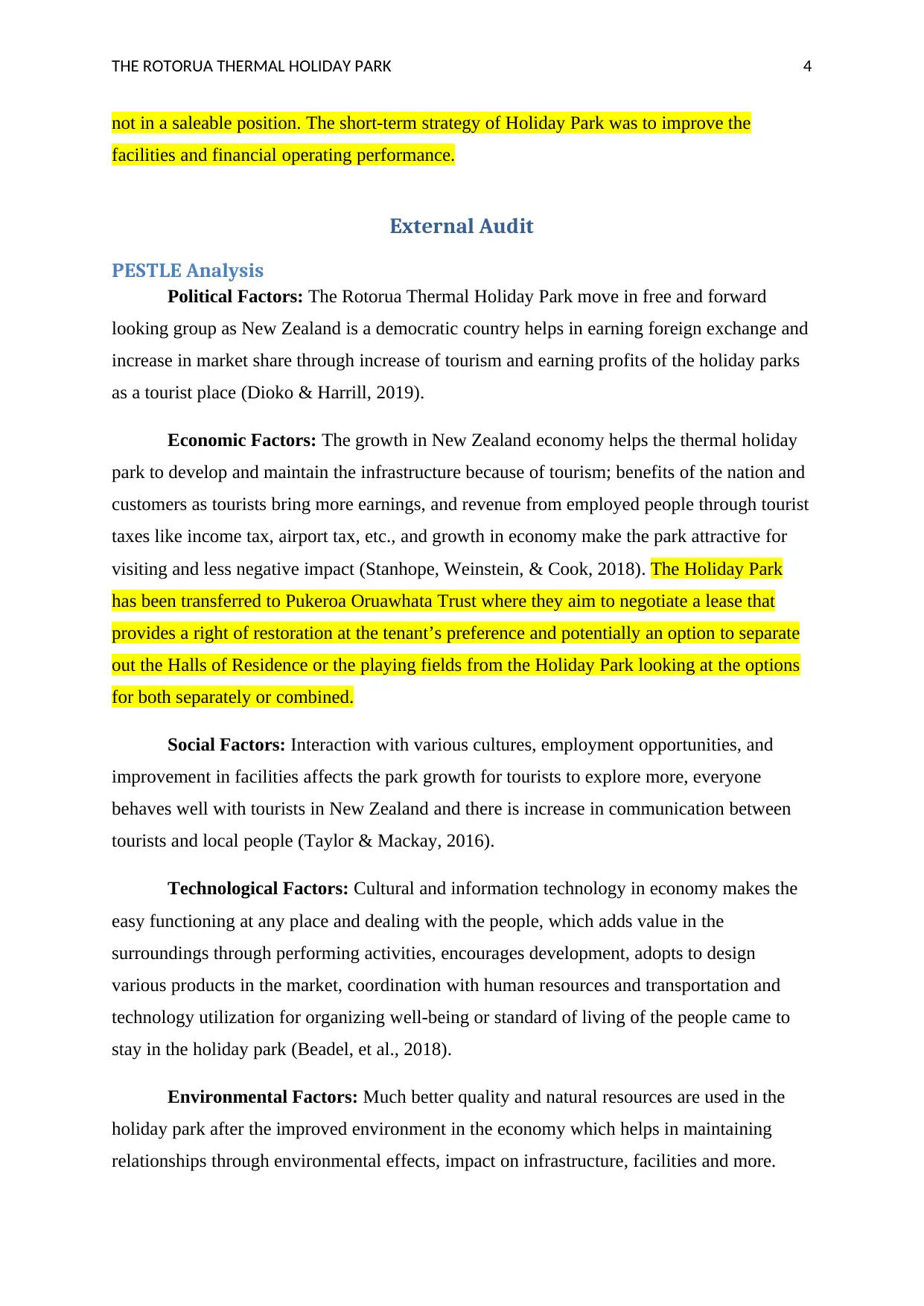
THE ROTORUA THERMAL HOLIDAY PARK 4
not in a saleable position. The short-term strategy of Holiday Park was to improve the
facilities and financial operating performance.
External Audit
PESTLE Analysis
Political Factors: The Rotorua Thermal Holiday Park move in free and forward
looking group as New Zealand is a democratic country helps in earning foreign exchange and
increase in market share through increase of tourism and earning profits of the holiday parks
as a tourist place (Dioko & Harrill, 2019).
Economic Factors: The growth in New Zealand economy helps the thermal holiday
park to develop and maintain the infrastructure because of tourism; benefits of the nation and
customers as tourists bring more earnings, and revenue from employed people through tourist
taxes like income tax, airport tax, etc., and growth in economy make the park attractive for
visiting and less negative impact (Stanhope, Weinstein, & Cook, 2018). The Holiday Park
has been transferred to Pukeroa Oruawhata Trust where they aim to negotiate a lease that
provides a right of restoration at the tenant’s preference and potentially an option to separate
out the Halls of Residence or the playing fields from the Holiday Park looking at the options
for both separately or combined.
Social Factors: Interaction with various cultures, employment opportunities, and
improvement in facilities affects the park growth for tourists to explore more, everyone
behaves well with tourists in New Zealand and there is increase in communication between
tourists and local people (Taylor & Mackay, 2016).
Technological Factors: Cultural and information technology in economy makes the
easy functioning at any place and dealing with the people, which adds value in the
surroundings through performing activities, encourages development, adopts to design
various products in the market, coordination with human resources and transportation and
technology utilization for organizing well-being or standard of living of the people came to
stay in the holiday park (Beadel, et al., 2018).
Environmental Factors: Much better quality and natural resources are used in the
holiday park after the improved environment in the economy which helps in maintaining
relationships through environmental effects, impact on infrastructure, facilities and more.
not in a saleable position. The short-term strategy of Holiday Park was to improve the
facilities and financial operating performance.
External Audit
PESTLE Analysis
Political Factors: The Rotorua Thermal Holiday Park move in free and forward
looking group as New Zealand is a democratic country helps in earning foreign exchange and
increase in market share through increase of tourism and earning profits of the holiday parks
as a tourist place (Dioko & Harrill, 2019).
Economic Factors: The growth in New Zealand economy helps the thermal holiday
park to develop and maintain the infrastructure because of tourism; benefits of the nation and
customers as tourists bring more earnings, and revenue from employed people through tourist
taxes like income tax, airport tax, etc., and growth in economy make the park attractive for
visiting and less negative impact (Stanhope, Weinstein, & Cook, 2018). The Holiday Park
has been transferred to Pukeroa Oruawhata Trust where they aim to negotiate a lease that
provides a right of restoration at the tenant’s preference and potentially an option to separate
out the Halls of Residence or the playing fields from the Holiday Park looking at the options
for both separately or combined.
Social Factors: Interaction with various cultures, employment opportunities, and
improvement in facilities affects the park growth for tourists to explore more, everyone
behaves well with tourists in New Zealand and there is increase in communication between
tourists and local people (Taylor & Mackay, 2016).
Technological Factors: Cultural and information technology in economy makes the
easy functioning at any place and dealing with the people, which adds value in the
surroundings through performing activities, encourages development, adopts to design
various products in the market, coordination with human resources and transportation and
technology utilization for organizing well-being or standard of living of the people came to
stay in the holiday park (Beadel, et al., 2018).
Environmental Factors: Much better quality and natural resources are used in the
holiday park after the improved environment in the economy which helps in maintaining
relationships through environmental effects, impact on infrastructure, facilities and more.
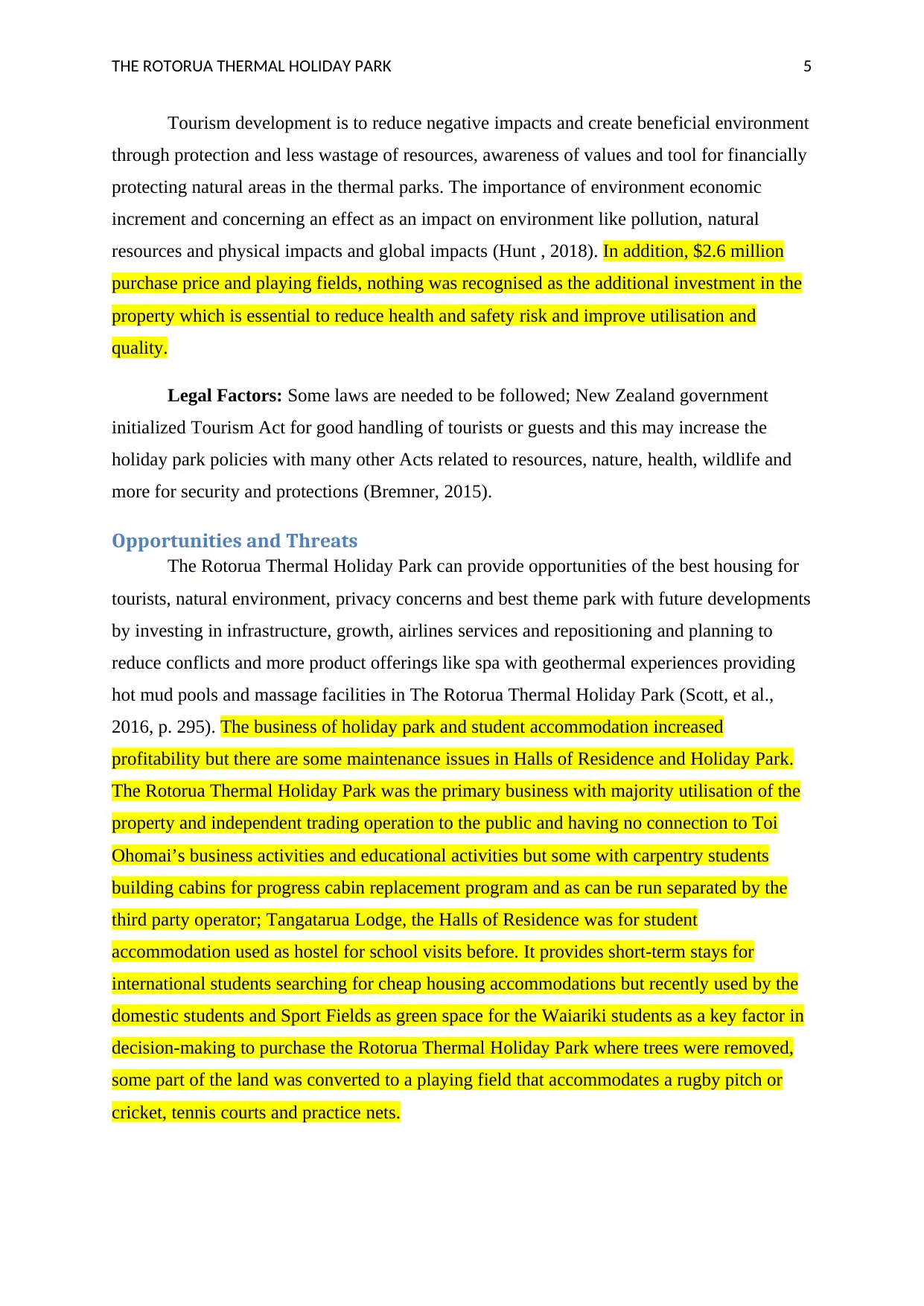
THE ROTORUA THERMAL HOLIDAY PARK 5
Tourism development is to reduce negative impacts and create beneficial environment
through protection and less wastage of resources, awareness of values and tool for financially
protecting natural areas in the thermal parks. The importance of environment economic
increment and concerning an effect as an impact on environment like pollution, natural
resources and physical impacts and global impacts (Hunt , 2018). In addition, $2.6 million
purchase price and playing fields, nothing was recognised as the additional investment in the
property which is essential to reduce health and safety risk and improve utilisation and
quality.
Legal Factors: Some laws are needed to be followed; New Zealand government
initialized Tourism Act for good handling of tourists or guests and this may increase the
holiday park policies with many other Acts related to resources, nature, health, wildlife and
more for security and protections (Bremner, 2015).
Opportunities and Threats
The Rotorua Thermal Holiday Park can provide opportunities of the best housing for
tourists, natural environment, privacy concerns and best theme park with future developments
by investing in infrastructure, growth, airlines services and repositioning and planning to
reduce conflicts and more product offerings like spa with geothermal experiences providing
hot mud pools and massage facilities in The Rotorua Thermal Holiday Park (Scott, et al.,
2016, p. 295). The business of holiday park and student accommodation increased
profitability but there are some maintenance issues in Halls of Residence and Holiday Park.
The Rotorua Thermal Holiday Park was the primary business with majority utilisation of the
property and independent trading operation to the public and having no connection to Toi
Ohomai’s business activities and educational activities but some with carpentry students
building cabins for progress cabin replacement program and as can be run separated by the
third party operator; Tangatarua Lodge, the Halls of Residence was for student
accommodation used as hostel for school visits before. It provides short-term stays for
international students searching for cheap housing accommodations but recently used by the
domestic students and Sport Fields as green space for the Waiariki students as a key factor in
decision-making to purchase the Rotorua Thermal Holiday Park where trees were removed,
some part of the land was converted to a playing field that accommodates a rugby pitch or
cricket, tennis courts and practice nets.
Tourism development is to reduce negative impacts and create beneficial environment
through protection and less wastage of resources, awareness of values and tool for financially
protecting natural areas in the thermal parks. The importance of environment economic
increment and concerning an effect as an impact on environment like pollution, natural
resources and physical impacts and global impacts (Hunt , 2018). In addition, $2.6 million
purchase price and playing fields, nothing was recognised as the additional investment in the
property which is essential to reduce health and safety risk and improve utilisation and
quality.
Legal Factors: Some laws are needed to be followed; New Zealand government
initialized Tourism Act for good handling of tourists or guests and this may increase the
holiday park policies with many other Acts related to resources, nature, health, wildlife and
more for security and protections (Bremner, 2015).
Opportunities and Threats
The Rotorua Thermal Holiday Park can provide opportunities of the best housing for
tourists, natural environment, privacy concerns and best theme park with future developments
by investing in infrastructure, growth, airlines services and repositioning and planning to
reduce conflicts and more product offerings like spa with geothermal experiences providing
hot mud pools and massage facilities in The Rotorua Thermal Holiday Park (Scott, et al.,
2016, p. 295). The business of holiday park and student accommodation increased
profitability but there are some maintenance issues in Halls of Residence and Holiday Park.
The Rotorua Thermal Holiday Park was the primary business with majority utilisation of the
property and independent trading operation to the public and having no connection to Toi
Ohomai’s business activities and educational activities but some with carpentry students
building cabins for progress cabin replacement program and as can be run separated by the
third party operator; Tangatarua Lodge, the Halls of Residence was for student
accommodation used as hostel for school visits before. It provides short-term stays for
international students searching for cheap housing accommodations but recently used by the
domestic students and Sport Fields as green space for the Waiariki students as a key factor in
decision-making to purchase the Rotorua Thermal Holiday Park where trees were removed,
some part of the land was converted to a playing field that accommodates a rugby pitch or
cricket, tennis courts and practice nets.
⊘ This is a preview!⊘
Do you want full access?
Subscribe today to unlock all pages.

Trusted by 1+ million students worldwide
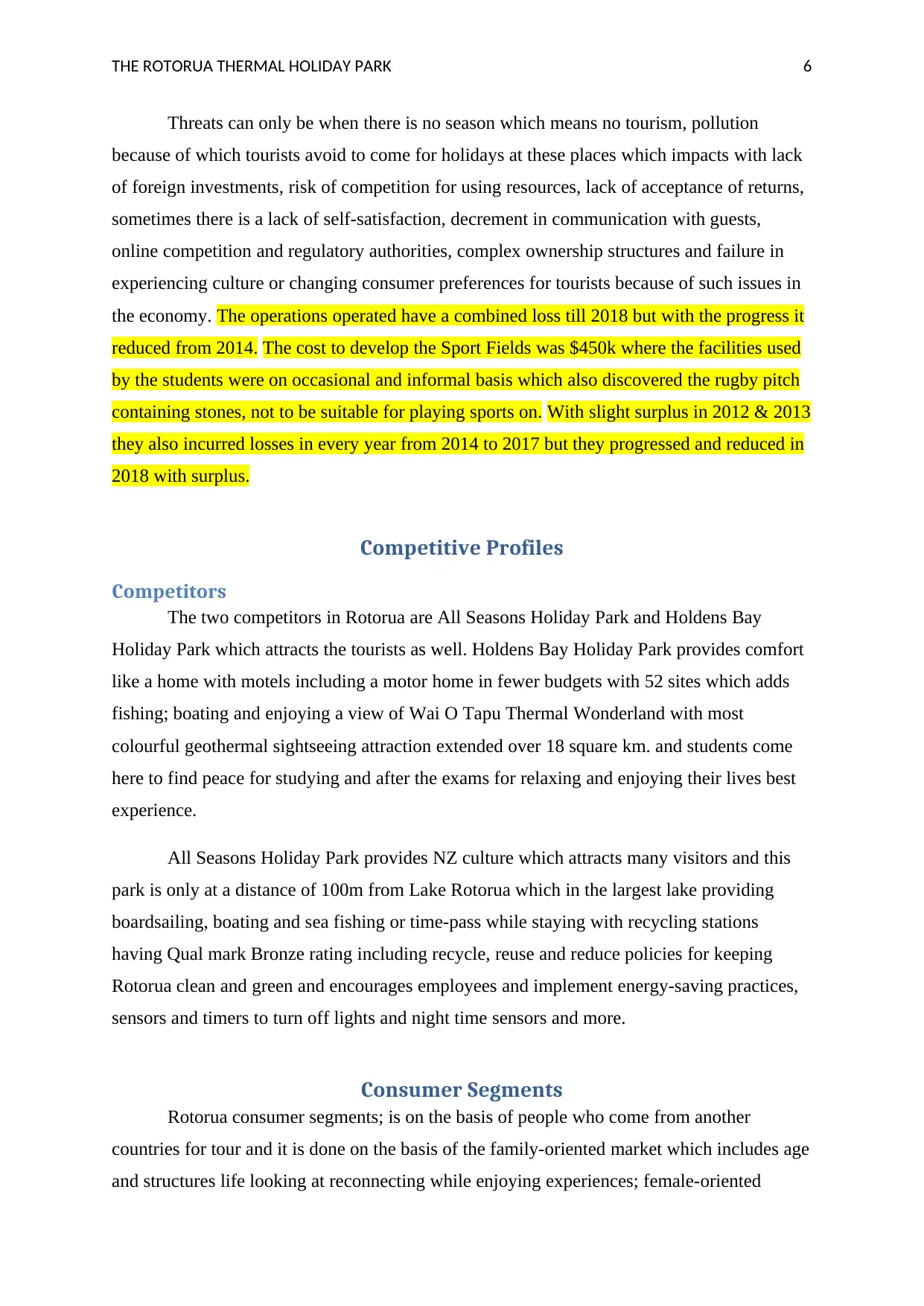
THE ROTORUA THERMAL HOLIDAY PARK 6
Threats can only be when there is no season which means no tourism, pollution
because of which tourists avoid to come for holidays at these places which impacts with lack
of foreign investments, risk of competition for using resources, lack of acceptance of returns,
sometimes there is a lack of self-satisfaction, decrement in communication with guests,
online competition and regulatory authorities, complex ownership structures and failure in
experiencing culture or changing consumer preferences for tourists because of such issues in
the economy. The operations operated have a combined loss till 2018 but with the progress it
reduced from 2014. The cost to develop the Sport Fields was $450k where the facilities used
by the students were on occasional and informal basis which also discovered the rugby pitch
containing stones, not to be suitable for playing sports on. With slight surplus in 2012 & 2013
they also incurred losses in every year from 2014 to 2017 but they progressed and reduced in
2018 with surplus.
Competitive Profiles
Competitors
The two competitors in Rotorua are All Seasons Holiday Park and Holdens Bay
Holiday Park which attracts the tourists as well. Holdens Bay Holiday Park provides comfort
like a home with motels including a motor home in fewer budgets with 52 sites which adds
fishing; boating and enjoying a view of Wai O Tapu Thermal Wonderland with most
colourful geothermal sightseeing attraction extended over 18 square km. and students come
here to find peace for studying and after the exams for relaxing and enjoying their lives best
experience.
All Seasons Holiday Park provides NZ culture which attracts many visitors and this
park is only at a distance of 100m from Lake Rotorua which in the largest lake providing
boardsailing, boating and sea fishing or time-pass while staying with recycling stations
having Qual mark Bronze rating including recycle, reuse and reduce policies for keeping
Rotorua clean and green and encourages employees and implement energy-saving practices,
sensors and timers to turn off lights and night time sensors and more.
Consumer Segments
Rotorua consumer segments; is on the basis of people who come from another
countries for tour and it is done on the basis of the family-oriented market which includes age
and structures life looking at reconnecting while enjoying experiences; female-oriented
Threats can only be when there is no season which means no tourism, pollution
because of which tourists avoid to come for holidays at these places which impacts with lack
of foreign investments, risk of competition for using resources, lack of acceptance of returns,
sometimes there is a lack of self-satisfaction, decrement in communication with guests,
online competition and regulatory authorities, complex ownership structures and failure in
experiencing culture or changing consumer preferences for tourists because of such issues in
the economy. The operations operated have a combined loss till 2018 but with the progress it
reduced from 2014. The cost to develop the Sport Fields was $450k where the facilities used
by the students were on occasional and informal basis which also discovered the rugby pitch
containing stones, not to be suitable for playing sports on. With slight surplus in 2012 & 2013
they also incurred losses in every year from 2014 to 2017 but they progressed and reduced in
2018 with surplus.
Competitive Profiles
Competitors
The two competitors in Rotorua are All Seasons Holiday Park and Holdens Bay
Holiday Park which attracts the tourists as well. Holdens Bay Holiday Park provides comfort
like a home with motels including a motor home in fewer budgets with 52 sites which adds
fishing; boating and enjoying a view of Wai O Tapu Thermal Wonderland with most
colourful geothermal sightseeing attraction extended over 18 square km. and students come
here to find peace for studying and after the exams for relaxing and enjoying their lives best
experience.
All Seasons Holiday Park provides NZ culture which attracts many visitors and this
park is only at a distance of 100m from Lake Rotorua which in the largest lake providing
boardsailing, boating and sea fishing or time-pass while staying with recycling stations
having Qual mark Bronze rating including recycle, reuse and reduce policies for keeping
Rotorua clean and green and encourages employees and implement energy-saving practices,
sensors and timers to turn off lights and night time sensors and more.
Consumer Segments
Rotorua consumer segments; is on the basis of people who come from another
countries for tour and it is done on the basis of the family-oriented market which includes age
and structures life looking at reconnecting while enjoying experiences; female-oriented
Paraphrase This Document
Need a fresh take? Get an instant paraphrase of this document with our AI Paraphraser
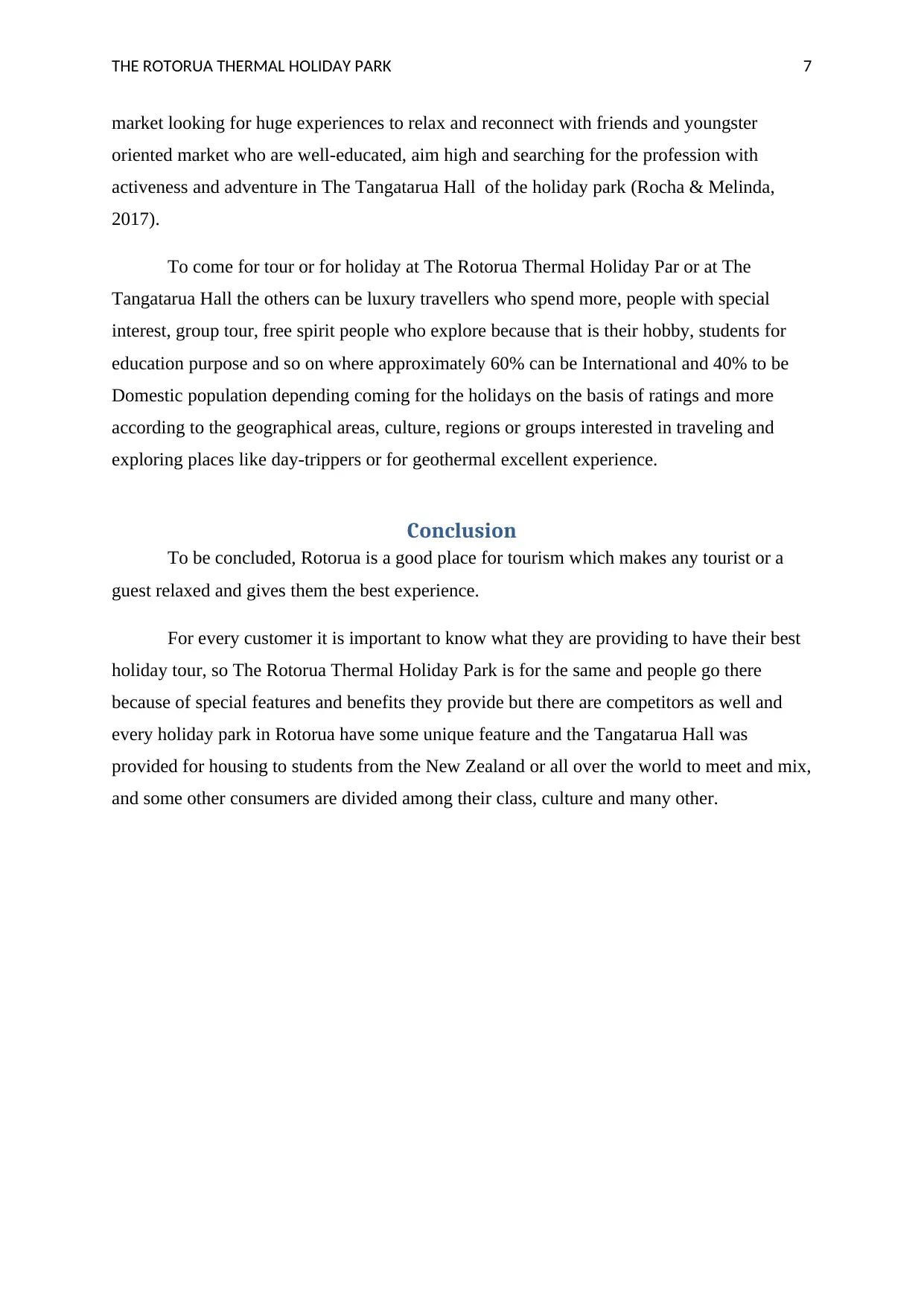
THE ROTORUA THERMAL HOLIDAY PARK 7
market looking for huge experiences to relax and reconnect with friends and youngster
oriented market who are well-educated, aim high and searching for the profession with
activeness and adventure in The Tangatarua Hall of the holiday park (Rocha & Melinda,
2017).
To come for tour or for holiday at The Rotorua Thermal Holiday Par or at The
Tangatarua Hall the others can be luxury travellers who spend more, people with special
interest, group tour, free spirit people who explore because that is their hobby, students for
education purpose and so on where approximately 60% can be International and 40% to be
Domestic population depending coming for the holidays on the basis of ratings and more
according to the geographical areas, culture, regions or groups interested in traveling and
exploring places like day-trippers or for geothermal excellent experience.
Conclusion
To be concluded, Rotorua is a good place for tourism which makes any tourist or a
guest relaxed and gives them the best experience.
For every customer it is important to know what they are providing to have their best
holiday tour, so The Rotorua Thermal Holiday Park is for the same and people go there
because of special features and benefits they provide but there are competitors as well and
every holiday park in Rotorua have some unique feature and the Tangatarua Hall was
provided for housing to students from the New Zealand or all over the world to meet and mix,
and some other consumers are divided among their class, culture and many other.
market looking for huge experiences to relax and reconnect with friends and youngster
oriented market who are well-educated, aim high and searching for the profession with
activeness and adventure in The Tangatarua Hall of the holiday park (Rocha & Melinda,
2017).
To come for tour or for holiday at The Rotorua Thermal Holiday Par or at The
Tangatarua Hall the others can be luxury travellers who spend more, people with special
interest, group tour, free spirit people who explore because that is their hobby, students for
education purpose and so on where approximately 60% can be International and 40% to be
Domestic population depending coming for the holidays on the basis of ratings and more
according to the geographical areas, culture, regions or groups interested in traveling and
exploring places like day-trippers or for geothermal excellent experience.
Conclusion
To be concluded, Rotorua is a good place for tourism which makes any tourist or a
guest relaxed and gives them the best experience.
For every customer it is important to know what they are providing to have their best
holiday tour, so The Rotorua Thermal Holiday Park is for the same and people go there
because of special features and benefits they provide but there are competitors as well and
every holiday park in Rotorua have some unique feature and the Tangatarua Hall was
provided for housing to students from the New Zealand or all over the world to meet and mix,
and some other consumers are divided among their class, culture and many other.
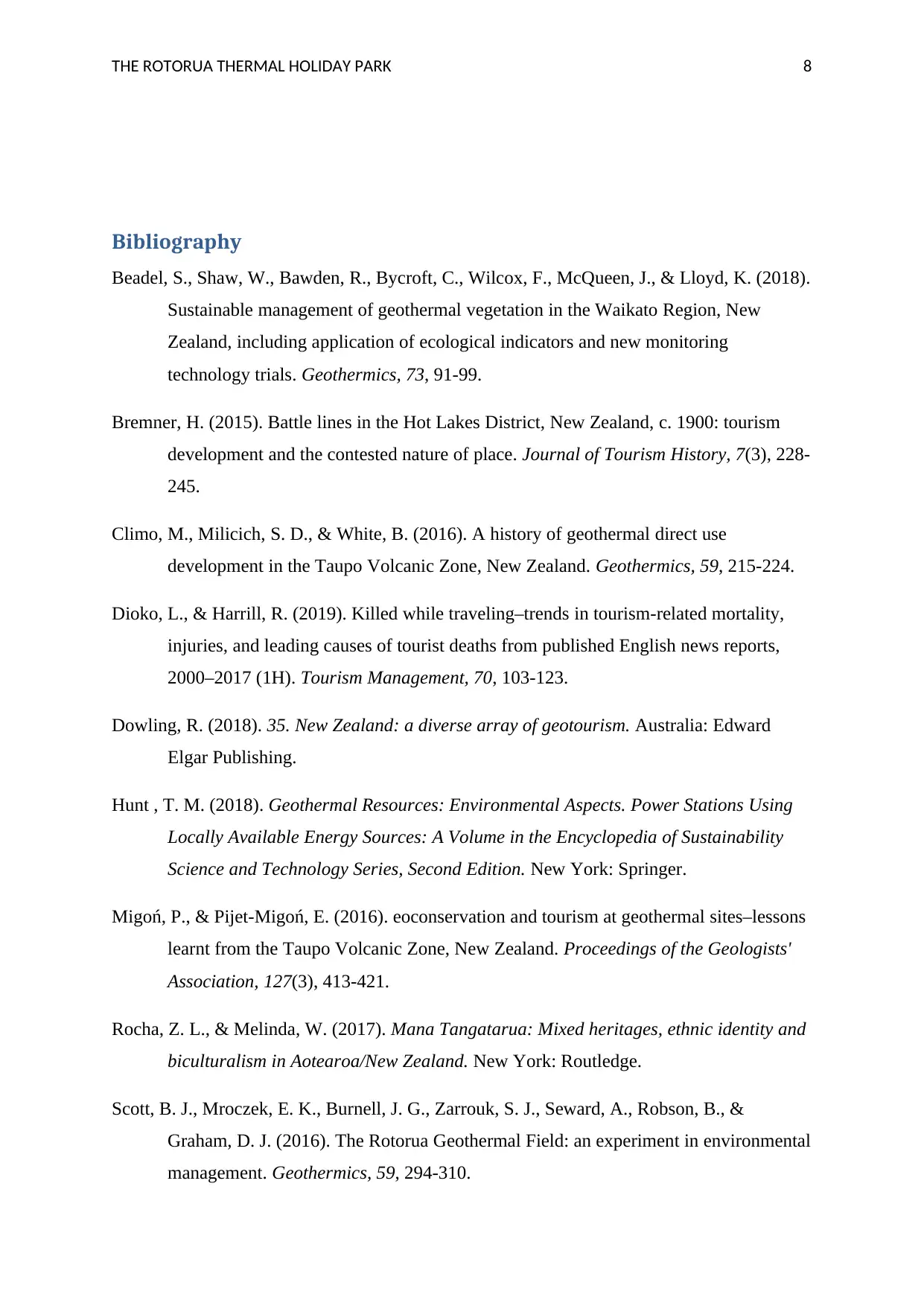
THE ROTORUA THERMAL HOLIDAY PARK 8
Bibliography
Beadel, S., Shaw, W., Bawden, R., Bycroft, C., Wilcox, F., McQueen, J., & Lloyd, K. (2018).
Sustainable management of geothermal vegetation in the Waikato Region, New
Zealand, including application of ecological indicators and new monitoring
technology trials. Geothermics, 73, 91-99.
Bremner, H. (2015). Battle lines in the Hot Lakes District, New Zealand, c. 1900: tourism
development and the contested nature of place. Journal of Tourism History, 7(3), 228-
245.
Climo, M., Milicich, S. D., & White, B. (2016). A history of geothermal direct use
development in the Taupo Volcanic Zone, New Zealand. Geothermics, 59, 215-224.
Dioko, L., & Harrill, R. (2019). Killed while traveling–trends in tourism-related mortality,
injuries, and leading causes of tourist deaths from published English news reports,
2000–2017 (1H). Tourism Management, 70, 103-123.
Dowling, R. (2018). 35. New Zealand: a diverse array of geotourism. Australia: Edward
Elgar Publishing.
Hunt , T. M. (2018). Geothermal Resources: Environmental Aspects. Power Stations Using
Locally Available Energy Sources: A Volume in the Encyclopedia of Sustainability
Science and Technology Series, Second Edition. New York: Springer.
Migoń, P., & Pijet-Migoń, E. (2016). eoconservation and tourism at geothermal sites–lessons
learnt from the Taupo Volcanic Zone, New Zealand. Proceedings of the Geologists'
Association, 127(3), 413-421.
Rocha, Z. L., & Melinda, W. (2017). Mana Tangatarua: Mixed heritages, ethnic identity and
biculturalism in Aotearoa/New Zealand. New York: Routledge.
Scott, B. J., Mroczek, E. K., Burnell, J. G., Zarrouk, S. J., Seward, A., Robson, B., &
Graham, D. J. (2016). The Rotorua Geothermal Field: an experiment in environmental
management. Geothermics, 59, 294-310.
Bibliography
Beadel, S., Shaw, W., Bawden, R., Bycroft, C., Wilcox, F., McQueen, J., & Lloyd, K. (2018).
Sustainable management of geothermal vegetation in the Waikato Region, New
Zealand, including application of ecological indicators and new monitoring
technology trials. Geothermics, 73, 91-99.
Bremner, H. (2015). Battle lines in the Hot Lakes District, New Zealand, c. 1900: tourism
development and the contested nature of place. Journal of Tourism History, 7(3), 228-
245.
Climo, M., Milicich, S. D., & White, B. (2016). A history of geothermal direct use
development in the Taupo Volcanic Zone, New Zealand. Geothermics, 59, 215-224.
Dioko, L., & Harrill, R. (2019). Killed while traveling–trends in tourism-related mortality,
injuries, and leading causes of tourist deaths from published English news reports,
2000–2017 (1H). Tourism Management, 70, 103-123.
Dowling, R. (2018). 35. New Zealand: a diverse array of geotourism. Australia: Edward
Elgar Publishing.
Hunt , T. M. (2018). Geothermal Resources: Environmental Aspects. Power Stations Using
Locally Available Energy Sources: A Volume in the Encyclopedia of Sustainability
Science and Technology Series, Second Edition. New York: Springer.
Migoń, P., & Pijet-Migoń, E. (2016). eoconservation and tourism at geothermal sites–lessons
learnt from the Taupo Volcanic Zone, New Zealand. Proceedings of the Geologists'
Association, 127(3), 413-421.
Rocha, Z. L., & Melinda, W. (2017). Mana Tangatarua: Mixed heritages, ethnic identity and
biculturalism in Aotearoa/New Zealand. New York: Routledge.
Scott, B. J., Mroczek, E. K., Burnell, J. G., Zarrouk, S. J., Seward, A., Robson, B., &
Graham, D. J. (2016). The Rotorua Geothermal Field: an experiment in environmental
management. Geothermics, 59, 294-310.
⊘ This is a preview!⊘
Do you want full access?
Subscribe today to unlock all pages.

Trusted by 1+ million students worldwide
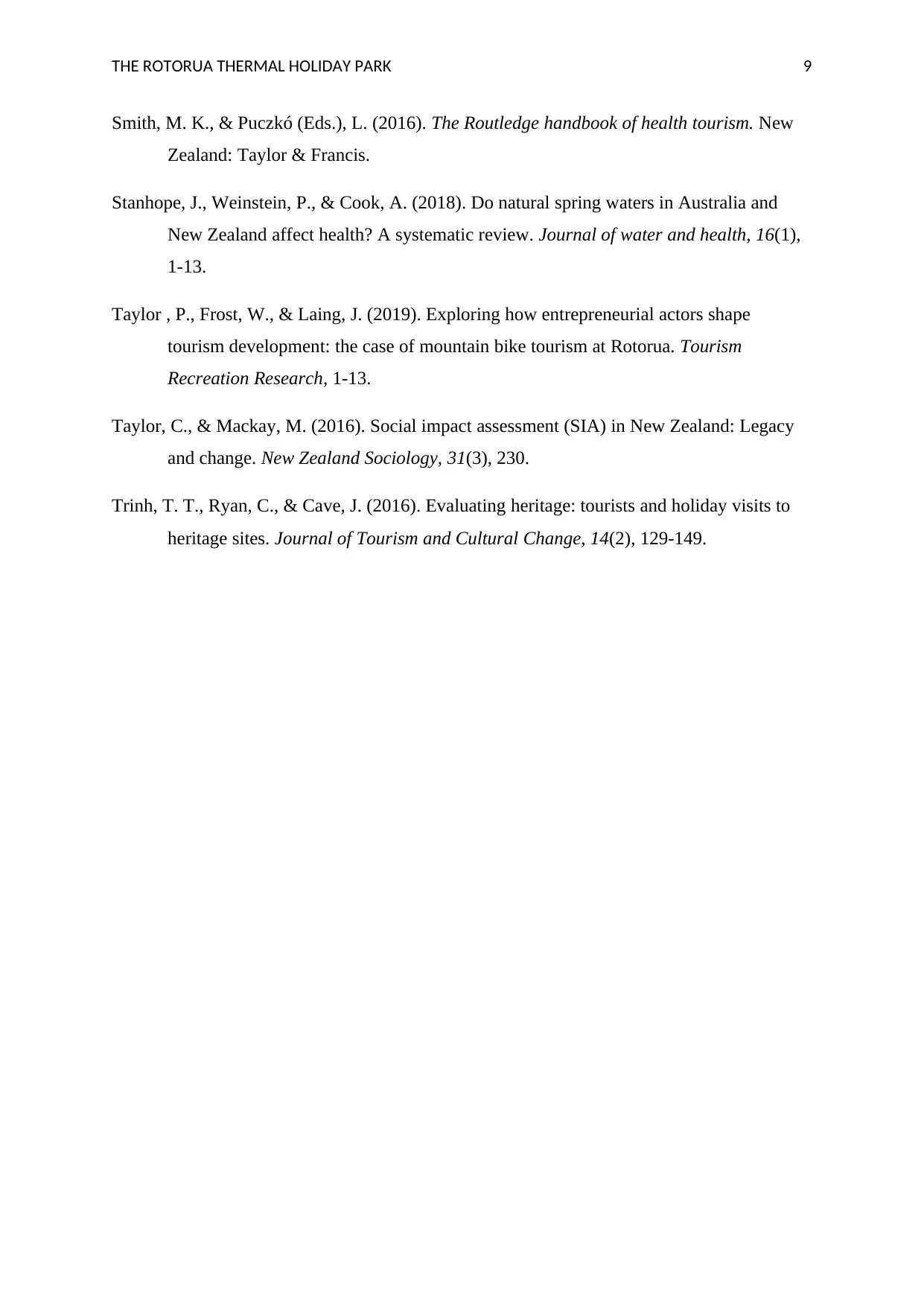
THE ROTORUA THERMAL HOLIDAY PARK 9
Smith, M. K., & Puczkó (Eds.), L. (2016). The Routledge handbook of health tourism. New
Zealand: Taylor & Francis.
Stanhope, J., Weinstein, P., & Cook, A. (2018). Do natural spring waters in Australia and
New Zealand affect health? A systematic review. Journal of water and health, 16(1),
1-13.
Taylor , P., Frost, W., & Laing, J. (2019). Exploring how entrepreneurial actors shape
tourism development: the case of mountain bike tourism at Rotorua. Tourism
Recreation Research, 1-13.
Taylor, C., & Mackay, M. (2016). Social impact assessment (SIA) in New Zealand: Legacy
and change. New Zealand Sociology, 31(3), 230.
Trinh, T. T., Ryan, C., & Cave, J. (2016). Evaluating heritage: tourists and holiday visits to
heritage sites. Journal of Tourism and Cultural Change, 14(2), 129-149.
Smith, M. K., & Puczkó (Eds.), L. (2016). The Routledge handbook of health tourism. New
Zealand: Taylor & Francis.
Stanhope, J., Weinstein, P., & Cook, A. (2018). Do natural spring waters in Australia and
New Zealand affect health? A systematic review. Journal of water and health, 16(1),
1-13.
Taylor , P., Frost, W., & Laing, J. (2019). Exploring how entrepreneurial actors shape
tourism development: the case of mountain bike tourism at Rotorua. Tourism
Recreation Research, 1-13.
Taylor, C., & Mackay, M. (2016). Social impact assessment (SIA) in New Zealand: Legacy
and change. New Zealand Sociology, 31(3), 230.
Trinh, T. T., Ryan, C., & Cave, J. (2016). Evaluating heritage: tourists and holiday visits to
heritage sites. Journal of Tourism and Cultural Change, 14(2), 129-149.
1 out of 10
Your All-in-One AI-Powered Toolkit for Academic Success.
+13062052269
info@desklib.com
Available 24*7 on WhatsApp / Email
![[object Object]](/_next/static/media/star-bottom.7253800d.svg)
Unlock your academic potential
Copyright © 2020–2026 A2Z Services. All Rights Reserved. Developed and managed by ZUCOL.